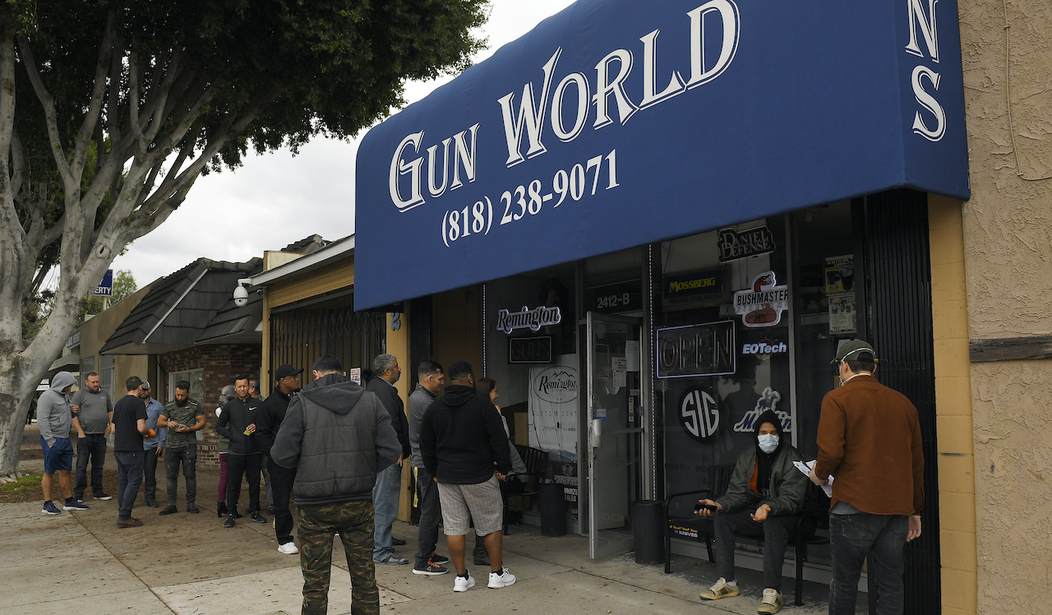It’s tough for Second Amendment activists to keep up with the ever evolving emergency orders issued by states and localities that are impacting our ability to buy, sell, and own firearms. The National Shooting Sports Foundation, however, has done an amazing job of putting together a database of emergency orders from around the country, color-coded to highlight those states that have officially deemed gun stores to be essential businesses, as well as states that are trying to shut down the lawful commerce of arms in a state of emergency.
According to the NSSF, right now New Jersey is the only state to explicitly put a halt on gun sales by ordering the closure of gun stores, though there are a number of states that haven’t deemed gun stores to be essential businesses, including California, New York, Oregon, Pennsylvania, and West Virginia. On the other hand, the firearms industry trade group notes that many states have passed specific protections for gun owners in a state of emergency, including Nevada, Virginia, and Tennessee.
Those laws were put on the books in the aftermath of the Hurricane Katrina disaster in New Orleans, when thousands of legally owned firearms were confiscated by police. The National Rifle Association launched a campaign to ensure that what happened in New Orleans couldn’t happen in future disasters and emergencies, and thankfully they were successful in changing the laws in many states. In fact, the NRA is still working on emergency powers legislation, and the organization applauded Kansas lawmakers less than a week ago for approving a resolution that prevents the governor from limiting gun sales in a state of emergency.
Of course the media attacked the NRA for its push for emergency powers legislation preventing the seizure of firearms or the stoppage of gun sales. In 2008, the Los Angeles Times ran a story mocking the idea that people would want a firearm during an emergency.
One by one, states — mostly in the West, Midwest and South — have followed with laws specifying that a state’s emergency powers do not allow it to confiscate firearms. Most have passed with little or no opposition.
Those who have criticized the measures say they pander to the fears of extremists or could prevent police from protecting public safety, such as stopping people with guns from entering emergency shelters.
One state weighing the law this year is Nebraska, where Democratic state Sen. Kent Rogert said he introduced the bill at the urging of the NRA. Like Jaggi in Wyoming, he considers a disaster on the scale of Katrina unlikely, but said it was prudent to guard against potential abuses during an emergency.
“It’s been a pretty popular issue in my district,” Rogert said.
As it turns out, it was very prudent indeed for lawmakers to approve these measures, and it was incredibly important for the NRA to promote emergency powers legislation from coast to coast. Who could have foreseen that a little more than a decade later, every state in the union would be looking at a declared emergency?
Unfortunately, some states skipped out on the opportunity to protect the Second Amendment rights of residents during an emergency, which is why we find ourselves with some governors doing everything they can to curtail the right to keep and bear arms right now.
The NSSF says it’s talking to the Department of Homeland Security to get “firearm and ammunition product manufacturers, retailers, importers, distributors and ranges” added to the list of critical infrastructure, but at the moment we’re largely relying on the state-level protections put in place after Hurricane Katrina to protect our rights during this time of uncertainty. The NSSF’s database is a great resource for FFL’s and gun owners trying to keep up with the ever changing rules and orders impacting our Second Amendment rights.










Join the conversation as a VIP Member